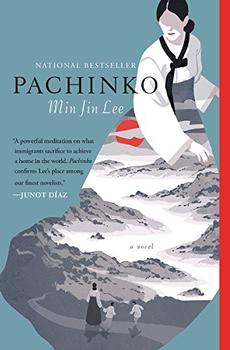Summary | Excerpt | Reading Guide | Reviews | Beyond the Book | Readalikes | Genres & Themes | Author Bio

Hoonie's mother led the matchmaker to the kitchen; they had to speak in low tones since the boarders were sleeping in the front rooms. It was late morning, and the lodgers who'd fished through the evening had finished their hot suppers, washed up, and gone to bed. Hoonie's mother poured the matchmaker a cup of cold barley tea but didn't break from her own work.
Naturally, the mother guessed what the matchmaker wanted, but she couldn't fathom what to say. Hoonie had never asked his parents for a bride. It was unthinkable that a decent family would let their daughter marry someone with deformities, since such things were inevitable in the next generation. She had never seen her son talk to a girl; most village girls avoided the sight of him, and Hoonie would have known enough not to want something he could not have—this forbearance was something that any normal peasant would have accepted about his life and what he was allowed to desire.
The matchmaker's funny little face was puffy and pink; black flinty eyes darted intelligently, and she was careful to say only nice things. The woman licked her lips as if she was thirsty; Hoonie's mother felt the woman observing her and every detail of the house, measuring the size of the kitchen with her exacting eyes.
The matchmaker, however, would have had great difficulty in reading Hoonie's mother, a quiet woman who worked from waking until bed, doing what was needed for that day and the next. She rarely went to the market, because there was no time for distracting chatter; she sent Hoonie for the shopping. While the matchmaker talked, Hoonie's mother's mouth remained unmoving and steady, much like the heavy pine table she was cutting her radishes on.
The matchmaker brought it up first. So there was that unfortunate matter of his foot and broken lip, but Hoonie was clearly a good boy— educated and strong as a pair of oxen! She was blessed to have such a fine son, the matchmaker said. She deprecated her own children: Neither of her boys was dedicated to books or commerce, but they were not terrible boys. Her daughter married too early and lived too far away. All good marriages, the matchmaker supposed, but her sons were lazy. Not like Hoonie. After her speech, the matchmaker stared at the olive-skinned woman whose face was immobile, casting about for any sign of interest.
Hoonie's mother kept her head down, handling her sharp knife confidently—each cube of radish was square and certain. When a large mound of white radish cubes formed on the cutting board, she transferred the load in a clean swipe into a mixing bowl. She was paying such careful attention to the matchmaker's talking that privately, Hoonie's mother feared she would begin to shake from nerves.
Before stepping into the house, the matchmaker had walked around its perimeter to assess the financial condition of the household. From all appearances, the neighborhood talk of their stable situation could be confirmed. In the kitchen garden, ponytail radishes, grown fat and heavy from the early spring rain, were ready to be pulled from the brown earth. Pollack and squid strung neatly across a long clothesline dried in the lacy spring sun. Beside the outhouse, three black pigs were kept in a clean pen built from local stone and mortar. The matchmaker counted seven chickens and a rooster in the backyard. Their prosperity was more evident inside the house.
In the kitchen, stacks of rice and soup bowls rested on well-built shelves, and braids of white garlic and red chilies hung from the low kitchen rafters. In the corner, near the washbasin, there was an enormous woven basket heaped with freshly dug potatoes. The comforting aroma of barley and millet steaming in the black rice pot wafted through the small house.
Satisfied with the boardinghouse's comfortable situation in a country growing steadily poorer, the matchmaker was certain that even Hoonie could have a healthy bride, so she plowed ahead.
Excerpted from Pachinko by Min Jin Lee. Copyright © 2017 by Min Jin Lee. Excerpted by permission of Grand Central Publishing. All rights reserved. No part of this excerpt may be reproduced or reprinted without permission in writing from the publisher.
Your guide toexceptional books
BookBrowse seeks out and recommends the best in contemporary fiction and nonfiction—books that not only engage and entertain but also deepen our understanding of ourselves and the world around us.